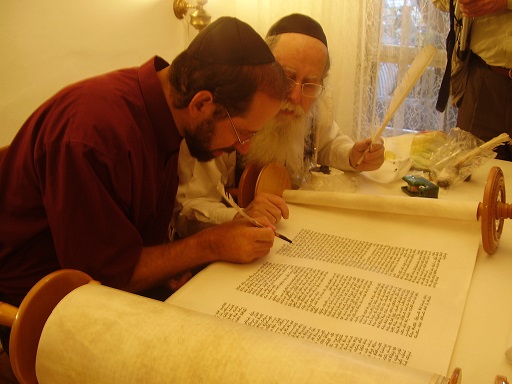- Home
- Krav Maga Blog
- Krav Instructors
- Train in Israel
- Tour Train Israel
- Krav Shop
- DVD
- Kickboxing
- IKI Near Me
- Seminars
- IKI Membership
- On-Line Training
- Krav Maga Training
- Testimonials
- History Krav Maga
- Instructors Page
- Past Blogs
- Spanish
- Italian
- Certification
- Contact
- Holland Seminar
- Vienna Seminar
- Poland Seminar
- Italy Seminar
- Belt Requirements
Does it Change the Meaning?
By Moshe Katz
CEO
Israeli Krav International
October 9, 2017, Israel
Each week I read the Torah in the synagogue. Those few minutes are the highlight of my week. Each week I spend several hours preparing the Torah reading. What does this mean?
It means the following. The Torah in its original form, is a scroll. There are very few paragraphs, there is no punctuation and there are no "vowels" meaning, in Hebrew there dots, symbols that indicate if an A is pronounced Ah, Eee, Oh, Eh etc. In addition the Torah is read with a special tune, special notes. Each word has its own notes but these are not written in the scroll. You must prepare all this in advance.
I pray at a Yemenite synagogue where they have an unbroken tradition of thousands of years. Unlike European Jews they never left this region. They were not surrounded by English or German or French speakers but only by Arabic speakers. Arabic is a sister language to Hebrew and very similar in pronunciation.
I was trained to read by a professional "Mori", this is a Yemenite Torah reading teacher. Mostly he teaches children who begin their study at the age of five. I was 28 when I joined the group.
Yes, I sat at a desk with little children and began with the ABC, step by step. The teacher treated me no different from the other children. If I behaved well I received a candy at the end of class. (generally I stayed out of trouble and did not bother the other children).
The rabbi praised me for being willing to be in a children's class. One must be humble if one wants to learn.
That was many years ago and still I am often corrected by the congregants who often are more highly skilled than I am. It is not uncommon for someone to shout out, "Hey!! he mispronounced a word ever so slightly. Stop!"
I am never upset when I am corrected, it is always a chance to improve for next time.
The point I want to make here is when one is required to repeat a word or sentence. It is only when the error is one which causes a change in the meaning of the word or the sentence. This means that if the reader mispronounced a word but yet it did not change the meaning of the word, he is corrected but he need not stop and repeat that word. However if the mistake is such that the meaning of the word is changed, one must stop and correct this. Changing the meaning of the word means changing the meaning of the Torah, the Bible. We know that slight misunderstandings have led to huge mistakes over the years, thus every word matters. That is why so much is lost in translation. The Torah must be read in Hebrew.
And now the Krav Maga application.
I teach Krav Maga with a full heart and great passion. I do so to save lives and improve lives. Therefore I do not want to see my students make mistakes. However I cannot correct every tiny mistake, it would drive the students crazy. I try to focus on mistakes that "change the meaning" i.e. that cause the technique to lose its effectiveness.
Now sometimes students will do a technique and I will disapprove. And yet they will insist they are doing it exactly as I am, but I see a little mistake, but that little tiny mistake changes everything and causes the technique to lose its effectiveness. And yet other times mistakes will look big but, they do not change the essence of the technique, so I will let it go.
The bottom line is: Does the mistake change the nature of the technique and cause it to "change meaning" and lose its effectiveness?
What may appear as insignificant to the student may in fact invalidate the entire technique. It is up to the teacher to stop the student and say, "Hey, that changes the meaning" and correct him. And it does not matter how old you are, or how long you have been training.
And now I must prepare the Torah reading for this week.
